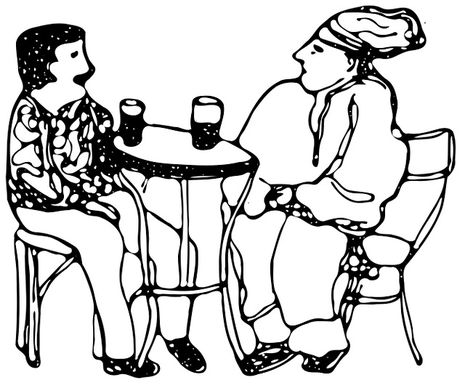Yes Sh*t Sherlock: Why we shouldn’t be ashamed to state the obvious
Ewan Martin explores the small pleasures that can be derived from stating the obvious

The majority of life goes without saying. In every passing moment we notice and experience more than we could ever have the time to relate. For every observation or opinion we decide to share, there are myriad which we keep to ourselves. And yet, given this abundance of talking points at our fingertips, it’s startling how often we find ourselves unsuccessfully grasping for something to say. The explanation is plain to see: although there is much that we could remark upon if we chose to, we dismiss most objects and instances as unremarkable.
Our restrictive need to feel revelatory
The criteria by which we rate a detail’s remarkability or an event’s potential to become the stuff of anecdote is an important but understated part of our etiquette. Of course, we know to avoid saying anything embarrassing, offensive, or irrelevant. But how do we decide what we should say? My best guess is that all ‘successful’ topics of conversation are somehow revelatory. Revelatory of an oncoming opportunity or threat, of a secret or a memory, of someone’s true character or the nature of the talker who reveals themselves through each opinion they express.
It’s the element of surprise we’re after, and it’s this standard which disqualifies the familiar, mundane, predictable, and cliché from our conversations — when we can help it.
“We all know the anxiety of being asked how we are on a day when we hardly even know who we are”
Unfortunately, we often find ourselves feeling rather unsurprising. We all know the anxiety of being asked how we are on a day when we hardly even know who we are. When we’re accosted by an acquaintance, it’s not always easy to produce anything that’s passably unpredictable. And so we swallow our pride and say a dull thing brightly.
That the weather endures as the inevitable topic for desperate conversers is (obviously) due to its immediacy, but also because of its capacity to always be presented as something which has pleasantly or unpleasantly taken us by surprise. Weather-talk may not provide us with intrigue itself, but it does allow us to give a gesture of intended intrigue, thereby showing that we understand the rules of the game, even if we’re having a hard time playing along at the moment.
Similarly, we might get closer to understanding the compulsions of the chronically sarcastic if we think of them as trying to disguise a statement of the obvious by craftily handing it to us inside-out. While we’re at it, let’s forgive ourselves for habitually saying ‘I find…’ before an opinion which we did not actually find, and which in truth seems to find us, again and again, whenever we hear someone try to claim it as their own.
But there’s no reason to get angsty about these attempts to veil our obvious observations. Instead, we should wonder why we’re so anxious to hide them in the first place.
Turning ‘duh!’ into wonder
Great conversations allow us to individualise ourselves and show our fellow chatterer that we’re both interested and interesting. So, we aspire towards talk which shows imagination, consideration, and a nice bit of personal depth. It’s more sophisticated to say ‘I’ve often thought...’ than ‘I think...’ because mulling over the stuff we can see, smell, hear, taste or feel right here, right now, is thought to be shallower than coughing up an opinion we’ve been chewing over for a while.
But must we value grazing any less than rumination? Let’s talk about the obvious.
There’s intrigue aplenty to be found in the familiar. The best conversations can emerge from talking about something seemingly obvious, when suddenly we discover a strangeness about it which had been hiding in plain sight. In these moments, we are reminded of the surprises awaiting in all things, ourselves included.
Just as stating the obvious can produce wonder, it can also provide us with a mundane and essential form of companionship: mutual reassurance, validation, and affirmation of our reactions to the things around us. Though disagreement is the life of conversation, it finds a happy, meaningful death if it can achieve consensus, and in this ever-shifting, subjectively experienced reality, we should celebrate rather than shun the masses of things we can point to together and agree upon. It’s no failure to agree that the sun is welcome, that litter is a disgrace, or that you still love each other in the morning, and again ten minutes later, and predictably again and again, making a moot point which ought not stay muted.
We worry about seeming generic when we’re trying to get to know people, but much of what we are is mundane, predictable, and cliché. These are the familiarities we share with strangers and friends alike, and to exclude them from our self-expression is to disregard the richness of our common clay.
“I’m becoming much better at having the integrity to say without irony that I had a nice time”
I’m becoming much better at having the integrity to say without irony that I had a nice time, that something felt amazing, or looked like an eye-sore, or was a strange and hilarious remark. Increasingly, I’m finding comfort in sharing simple, agreeable statements of observation, appreciation, disapproval, optimism - unadorned truths - with the people around me. The objective is not to seem more unique or original, but rather the opposite: to feel a more recognisable kinship with those in my company.
It’s working, but perhaps that’s needless to say…
 News / Eight Cambridge researchers awarded €17m in ERC research grants27 December 2025
News / Eight Cambridge researchers awarded €17m in ERC research grants27 December 2025 News / Clare Hall spent over £500k opposing busway 24 December 2025
News / Clare Hall spent over £500k opposing busway 24 December 2025 Comment / League tables do more harm than good26 December 2025
Comment / League tables do more harm than good26 December 2025 Comment / The ‘class’ of Cambridge24 December 2025
Comment / The ‘class’ of Cambridge24 December 2025 News / Caius mourns its tree-mendous loss23 December 2025
News / Caius mourns its tree-mendous loss23 December 2025










